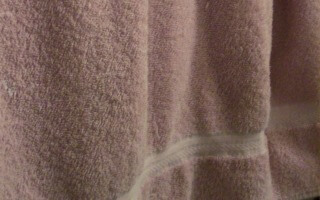This post, as many Vital Jake posts do, came because of a conversation I happened to have with a guy at church. He said he felt bad, and that he had been waking up with itchy eyes and a headache. I asked him how often he changed his sheets, and he was stumped. He didn’t know. A few times a year, he said.
That’s not nearly enough (see below). It’s also pretty gross. Because even though a guy may consider himself a clean person – he showers daily, brushes his teeth, and wears clean clothes – if his sheets are chock full of days’ or months’ worth of his skin cells, dust mites, etc., then those sheets may be making him feel bad.
 Maybe you made resolutions this New Year — things you want to do better, maybe a goal or two you hope to reach. Here are two easy-peasy changes you can make in your life. Both have the potential to make you feel better quickly.
Maybe you made resolutions this New Year — things you want to do better, maybe a goal or two you hope to reach. Here are two easy-peasy changes you can make in your life. Both have the potential to make you feel better quickly.
Change Your Sheets
Sheets can become gross fairly quickly. I’m not even talking about that “what body fluids would a black light pick up?” way, either. Sheets have to deal with a lot, including skin cells; food crumbs, if you eat in bed; dander and hair from humans and any pets; oils from the skin and hair; sweat; maybe some drool; residue from any skin care products you may use; and your own daily dirt, if you don’t take a shower or bath before bed. All of these things can accumulate fairly quickly. If you share your bed with a partner, a kid, and/or any pets, there’s even more of a buildup on those sheets.
 Bacteria feast on sweat and oils. Dust mites chow down on skin cells. If you, like millions of Americans, are allergic to dust mites, this can be really bad – in terms of stuffiness, headaches, dry and itchy eyes, respiratory problems, and if you already have asthma, making it worse. Most experts recommend changing your sheets at least once a week. If your allergies are severe, you may need to change them every day. My husband and I are both allergic to dust mites, and we have found, through trial and error, that we need to change our sheets every four or five days. If we don’t, what happens is predictable: we wake up with headaches and stuffiness. When we change the sheets, we notice the difference immediately.
Bacteria feast on sweat and oils. Dust mites chow down on skin cells. If you, like millions of Americans, are allergic to dust mites, this can be really bad – in terms of stuffiness, headaches, dry and itchy eyes, respiratory problems, and if you already have asthma, making it worse. Most experts recommend changing your sheets at least once a week. If your allergies are severe, you may need to change them every day. My husband and I are both allergic to dust mites, and we have found, through trial and error, that we need to change our sheets every four or five days. If we don’t, what happens is predictable: we wake up with headaches and stuffiness. When we change the sheets, we notice the difference immediately.
Skeptical? Try an experiment: If you are having a headache, stuffiness and other respiratory symptoms — particularly if symptoms are worse when you first wake up — change your sheets and see how you feel the next morning. At least, change your pillowcase, and if that helps, go whole hog and change the sheets and bedspread, too, and then keep doing it as often as you need to.
Then what? Wash your sheets in hot water, or on the allergy or steam cycle in your washing machine. If the water is cold or just warm, it’s not enough to kill the resilient, powerful, and evil dust mites.
If you have fancy sheets that can’t tolerate hot water, you could find a washer with a steam cycle, get them dry cleaned – or better yet, get cheaper sheets that can take the heat.
Also, vacuum your bedroom. Look under your bed. If there’s a lot of dust, guess what you’re breathing in? If you have a fan either over the bed or aimed at it, check that out, too. If there’s dust, that’s also blowing on you and your poor respiratory system all night long. So vacuum or dust that, too, and don’t forget dust-trappers like curtains. It all adds up.
Wash Your Towels
 If your answer to how often you change your towels is, “when they stink,” or “when they get gross,” maybe you need to have a better plan. According to Steve Boorstein, who co-wrote a book called The Clothing Doctor’s 99 Secrets to Cleaning & Clothing Care, you should wash your bath towel often – like, after every three times you use it. Bath towels tend to develop a distinct musty smell over time, for several reasons:
If your answer to how often you change your towels is, “when they stink,” or “when they get gross,” maybe you need to have a better plan. According to Steve Boorstein, who co-wrote a book called The Clothing Doctor’s 99 Secrets to Cleaning & Clothing Care, you should wash your bath towel often – like, after every three times you use it. Bath towels tend to develop a distinct musty smell over time, for several reasons:
One, we shed an estimated an estimated 1 billion skin cells every day. A lot of them get rubbed off in our clothes, sheets (see above), washcloths, towels, and even in the washing machine (which also needs to be cleaned every so often, by running an empty load with a cup of vinegar or 1/4 cup of bleach.)
Two: Thick, luxurious bath towels may not dry out completely between showers, so they’re just a breeding ground for bacteria. If you chuck your towel on the floor or in a hamper and then use it again, that constant dampness is basically hanging out the welcome sign for more bacteria to join the party, and stink up your towel.
Three: Fabric softeners not only make towels less absorbent, they can trap odors inside fabric. So don’t use one on your towels and washcloths, and see if you notice a difference.
Bottom line: If you can’t manage to change your towel a couple of times a week, then try to do it at least once a week. Wash your laundry with hot water. If you still feel like your towels aren’t getting clean, run bleach or vinegar through the washer.
Also, if you wash your face with the same washcloth day after day, you’re just rubbing that same dirt and bacteria right back onto your skin. So don’t wash your face with a dirty washcloth, either. If you can’t change it every day, at least, change it more often and see if you don’t feel better.
©Janet Farrar Worthington
